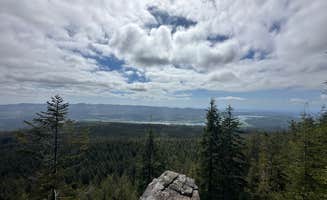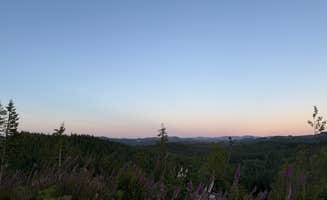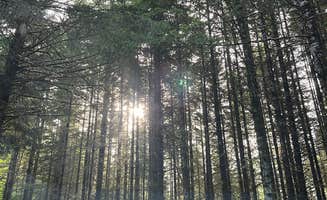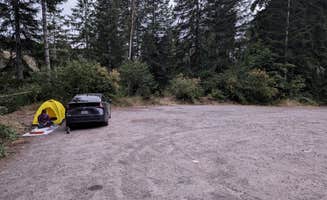Primitive camping near Long Beach, Washington offers secluded forest sites typically 30-60 minutes from the beach on forestry roads. Most dispersed sites sit at elevations between 800-2,000 feet, providing cooler temperatures in summer months compared to coastal areas. Access often requires navigating gravel roads that become increasingly narrow and rough at higher elevations.
What to do
Waterfall hiking: At Beaver Falls Trailhead, campers can access a beautiful waterfall via a short hike. According to Jaden J., "The waterfall is amazing and only a 15 minute hike down!" This makes for an easy day activity between beach visits.
Mountain viewing: Elevated campsites provide unique valley panoramas not available on the coast. Emma T. notes about Scenic Overlook Dispersed Camp: "There are a few options up here but one really phenomenal site with wide ranging views. Be weary that it is a long drive to get here and no way to tell if there's sites available until you do the entire drive up."
Wildlife watching: The forested areas around dispersed sites host diverse wildlife. Jeremy B. reported: "I saw a porcupine for the first time while wandering one of the side roads!" The quieter mountain locations offer better wildlife viewing opportunities than coastal campgrounds.
What campers like
Solitude: Many campers appreciate the isolation of these primitive sites. At Road to Snag Lake, Clayton P. experienced "Amazing views and complete silence! Tons of rabbits and wildflowers... We stayed on a Friday night in August and were the only ones here."
Cell coverage: Counterintuitively, some mountain sites offer excellent connectivity. Anna P. mentions: "Very quiet. Spots for van or tent are between radio/cell towers, so doesn't feel like wilderness but there is the potential for spectacular views if the clouds clear." Vivian N. confirms: "Long steep gravel road to get here but good spot with great cell reception."
Established sites: Most dispersed camping areas feature pre-existing fire rings and cleared areas. At soapstone lake trail dispersed camping, Alicia W. found "several spots with established fire pits. Secluded yet close to Cannon Beach. Road was very accessible. Creek and trailhead nearby."
What you should know
Road conditions: Access roads to primitive camping sites vary significantly in quality. Dawson T. reports about Cole Mt Ridge: "Road is gravel, pretty well maintained. There's a lot of pull off roads, not sure if you can go down all of them. I saw lots of sites available on a Thursday in August."
Security concerns: Some areas experience higher crime activity. Ryan D. cautions: "Cops came around about 930pm to inform me there is a high level of criminal activity around. To stay at my own risk. He was very friendly and left me his card. Lock up, don't leave anything outside and be aware."
Concrete pads: Several dispersed sites feature concrete pads from former structures, providing level tent platforms. Stephanie P. observed: "Concrete pads at multiple sites. Nobody drove by all night." These pads can be particularly valuable during wet weather when ground softens.
Tips for camping with families
Trash management: Some primitive sites suffer from litter problems. Mary S. took action: "There was some trash around the site and the road, so I picked up as much as I could." Bringing extra trash bags helps maintain these unserviced areas.
Weather preparations: Mountain sites can experience significantly different weather patterns than coastal areas. When camping at higher elevations near Long Beach, temperature drops of 10-15°F from daytime highs are common, particularly in spring and fall.
Navigation markers: Forest service roads often have minimal signage. Brianna S. advises: "The coordinates did not take us to the exact spot, but the pin on the map was the closest, it's actually to the left on the dirt road. You'll see a tiny dirt road going up hill and that's the spot." Download offline maps before departure.
Tips from RVers
Size limitations: Most primitive sites near Long Beach accommodate smaller rigs only. Charlotte S. warns: "Not friendly to large vehicles or RVs, roads are very thin and no place to park." Class B campervans and truck campers generally navigate these roads better than larger motorhomes.
Pull-out options: Several areas feature larger pull-outs suitable for overnight parking. Mike S. describes one location as "a large pull out on a quiet road in the woods... Very nice for a late night pull in. Not somewhere I would settle in for a few days, just a stop over."
Leveling challenges: Uneven terrain presents leveling difficulties. While some sites offer concrete pads, most require blocks or leveling systems. One camper noted their campsite required positioning "with my head pointing uphill when I go to bed" to ensure comfort during sleep.







